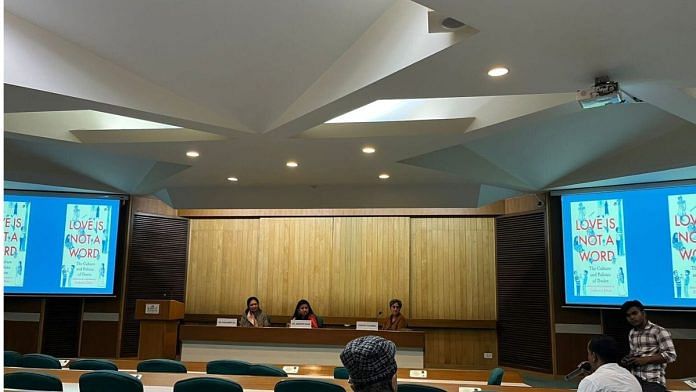New Delhi: It isn’t often that authors and scholars come together to talk about what love is. In fact, love is a lot like democracy. It isn’t debated every day, but its presence is there as a backdrop, taken for granted.
So, when Debotri Dhar, author of the book Love Is Not A Word, dissected love – for a person, country, community – she also spoke of its unacknowledged cousin ‘sacrifice’.
She joked that the biggest sacrifice she’s made for her book has been not getting married.
“I’ve written an essay on single women and self-love. What weight would it hold if the author is married?” Dhar said, laughing.
She quickly added that she has no regrets; love, after all, comes in many shapes and forms, “including education, vocation and travel”. But fellow academic and a contributor to the book, Malashri Lal, pointed out that in India, romantic love is seen as a pipeline into marriage.
It is ironic, then, that the third person on the panel, author Parvati Sharma, is one of the countless members of the queer community fighting for the right to get married.
Together, the three women led the audience at Delhi’s India Habitat Centre through how they viewed love—desi, dissenting, desirable, disruptive and more.
Reinterpreting love
Dhar, who teaches Women’s Studies at the University of Michigan, said that the idea to focus on the Indian perspective in the book was a pragmatic one; her publisher, Speaking Tiger, said that’s the best market.
Instead of it being restrictive, Dhar said it opened up a new and more provocative way of looking.
The book has essays on love jihad, love as a Dalit woman, the Kama Sutra, Ghalib’s poetry and even a love letter to a tree.
“On one hand, we’re creating these discussions on gender equality, on the other hand, we’re trying hard for it to not fall into the stereotypes the West gives up on a platter,” Dhar said while introducing Lal.
Through her body of work, which includes In Search of Sita: Revisiting Mythology and Finding Radha: The Quest for Love, Lal has consistently aimed to reinterpret Indian mythology to “open it up”.
She has followed this thread in her essay in Dhar’s book, too. Lal began by looking at the different ways love is seen in India. “I picked up three items. One is the swayamvara, the other is arranged marriage, and the third is the desi romance,” she said.
She returned to her earlier research to show that arranged marriage has not always been the norm in India. “I went back to the episode of the swayamvara [in the Ramayana]. If the woman had the choice of selecting her own husband on a public open platform… that is something that is so significant,” she said.
Lal then moved on to question the change. “Where does this idea come from that arranged marriage is the norm?”
Her essay proceeds to discuss Desi romance in Bollywood—Monsoon Wedding (2001) and A Suitable Boy (2020)—where the celebration is grand, and the subtext is messy.
To understand Indian love, Lal has also harkened back to Hindu mythology. From the single motherhood of Sita and Shankutala to celebrating the love between Radha and Krishna, an unmarried couple, India, she said, is home to more than one type of love.
“If we’re such a regressive, such a terrible culture that only suppresses women, then how is it that we also venerate Radha and Krishna? Everyone knows they’re not husband and wife,” Dhar added. “What we’re doing is we’re venerating love, and that’s beautiful.”
Also read: Who are the ‘guests that never left’? New book documents India’s invasive alien plants
Love from the queer lens
Sharma, too, returned to history, but unlike Lal, she looked at it through the lens of queerness to rediscover what she called dissenting love.
She told the tale of a “passionate homosexual love affair” between a warlord in Akbar’s army and a young guard, one of the many such relationships in the Mughal court.
Despite evidence that Babur, the emperor’s grandfather, had a male lover, the sensibilities of the Empire changed with their travel from Central Asia to India, Sharma said.
“Akbar objected to these relationships, often separating the lovers. What he was trying to do was fit in with the North Indian masculinity or, rather specifically, Rajput masculinity,” she said.
She also pointed out the contradictory ways in which the two most prominent historians at the time spoke about queer love. “Abul Fazl, seen as the more progressive one, condemns this love; he says it has none of the noble virtues that love should have. Whereas Abdul Qadir Badauni, who is highly critical of Akbar’s blasphemies, has a more romantic view of it,” she said.
According to Sharma, LGBTQIA++ love stories from history show two things. First, they help us examine the why and how of what is not allowed, and second, they dispel the notion that homosexuality and queerness are Western imports.
She also touched upon ‘pinkwashing’ and referred to those in power using it to justify their crimes. “There’s a picture of an Israeli soldier doing the rounds on Twitter, who was carrying, against a landscape of pure rubble, a rainbow flag. That is the opposite of what love is or should be,” she stressed.
To her, love doesn’t serve power. “Love is a dissent against power.”
Dhar picked up on Sharma’s strand of love, power and the nation and spoke about the state of Indian politics. “Love for one’s country almost makes it acceptable to hate someone who bears a different marker.”
The discussion ended with Dhar asking about the larger mission of love. “It’s bigger than the idea of romance. It’s world peace,” she said. It’s a tall order for a book, but as she proclaimed, love is not a word. “It holds more radical possibility than war ever could.”
(Edited by Zoya Bhatti)



